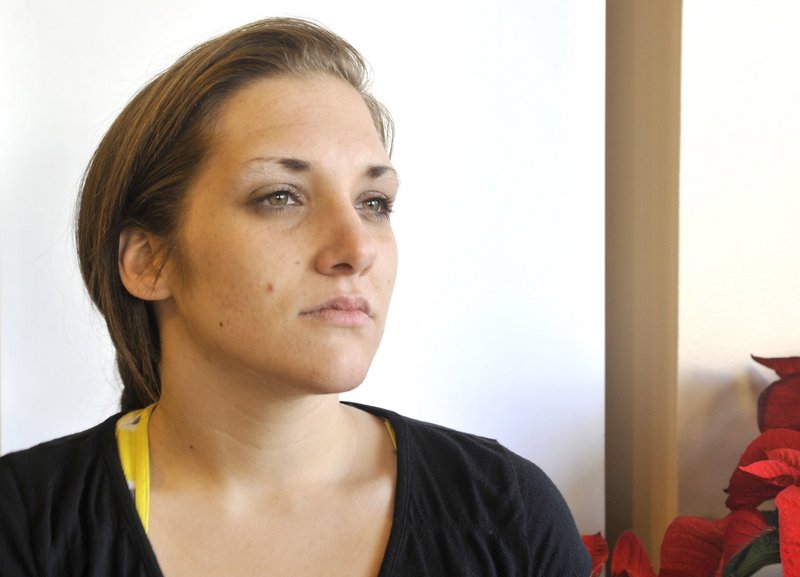Family members of missing Waterville toddler Ayla Reynolds traded accusations and calls to action today, even as authorities continued to withhold comment on the case and the dueling public appeals.
Meanwhile, experts on wrongful convictions say the slow, methodical pace of the nearly 2-year-old case is desirable because it wards against innocent people being unjustly charged and convicted.
Phoebe DiPietro, Ayla’s paternal grandmother, said today in a statement to the Morning Sentinel that the case should remain focused on finding the child rather than pressing for criminal charges.
Her comments came the same day that the missing girl’s mother, Trista Reynolds, released more detailed information she said police shared with her — mainly surrounding samples of Ayla’s blood found in the Waterville home where she was reported missing. The Reynolds statement was released by Jeff Hanson, Trista Reynolds’ former stepfather who operates the websites united4ayla.com and justiceforayla.blogspot.com. It calls for the prosecution of Ayla’s father, Justin DiPietro, his ex-girlfriend, Courtney Roberts, and DiPietro’s sister, Elisha DiPietro, who were at the 29 Violette Ave. home when Ayla was reported missing.
“We respect the dedication of the police agencies and the prosecutor’s office in pursuing this case,” the Reynolds statement said. “However, we disagree with delaying arrest and prosecution.”
Josh Tepfer is a Chicago-based attorney and co-director of the Center on Wrongful Convictions, which maintains a database of more than 2,000 crime convictions that are overturned when the person is proven innocent. While he was not affirming DiPietro’s innocence, he said criminal investigators have better insight into how — and when — to proceed.
“It’s often that family members are made suspects and it often turns into the burden for them to prove their innocence rather than the other way around,” Tepfer said.
Grandmother: Focus on finding Ayla
Phoebe DiPietro, mother of Justin DiPietro and owner of the Waterville residence where the child was reported missing, said the focus of the case should remain on finding Ayla and that bloggers and the media have a “way of distorting the truth.”
“Trista can say and do what she wants,” Phoebe DiPietro wrote. “I believe that the focus should remain on finding Ayla. Once Ayla is found, then and only then will I think about justice.”
Ayla Reynolds was reported missing on Dec. 17, 2011, and police have called the ongoing investigation the largest in the state’s history. State police have said they don’t believe the three adults that were in the house when Ayla disappeared have told them everything they know.
Phoebe DiPietro disputed this idea in her statement.
“You have heard and read over and over again that law enforcement believe the three adults know more than what they are saying,” Phoebe DiPietro said. “Let me ask you this, if they so strongly believe that, why are they not asking the questions? Why are they not scheduling meetings with my family or with my attorney?”
The information Reynolds released today — a five-page statement sent to many Maine media outlets — provides more details about what Reynolds said Maine State Police told her during a meeting on Jan. 3 this year.
Reynolds’ statement outlined seven additional locations that she said showed where police found Ayla’s blood inside the home, in addition to three locations she has talked about in recent interviews.
Because some of the blood was mixed with saliva, Ayla had likely coughed up blood from internal and external injuries, Reynolds’ statement says. Reynolds says police told her the spray pattern from some of the blood could not have come from a cut.
According to the statement, police found Ayla’s blood on the girl’s slippers, on the sofa in the upstairs living room, on a doll’s face, on a fan cord in the basement, on a plastic tote that had a bloody sheet inside of it, as well as splatters of Ayla’s blood on the cement floor and wall near DiPietro’s bed in the home’s basement.
Descriptions of how much blood Reynolds said was shown to her by police ranged from dime-sized splatters on the wall and floor, to a silver-dollar sized blood stain on the upstairs sofa, to a “fist-sized” stain on DiPietro’s mattress and sheet. The stain on the mattress and sheet also contained saliva, possibly vomit and a “toy-hair like pink fiber, which at the time, Maine State Police had not identified,” according to the statement.
In interviews earlier this month, Reynolds said police told her that Ayla’s blood was found in Justin DiPietro’s car, as well as on his shoes and in his bedroom.
A public appeal
The statement said Maine State Police presented the case details to Trista Reynolds as well as her boyfriend, Alex Favvi, and his mother, Melissa Favvi. The statement was a culmination of their memories of the slideshow given to them by three state police detectives and a grief counselor from the attorney general’s office.
The slideshow presentation started with photos of the inside of the DiPietro home, but was stopped after Reynolds viewed areas in the house that had been treated with a chemical known as Luminol that made blood stains visible, according to the statement.
“Trista was unable to view any more of the horrific display after only two luminol-enchanced photos,” according to the statement.
Maine State Police spokesman Steve McCausland couldn’t be reached for comment today, but has previously said that state police continue to keep Reynolds up-to-date with the investigation. McCausland has also previously said he has “no reaction” to Reynolds going public with the information.
Waterville Police Chief Joseph Massey said today that while the department has been following the media reports about the investigation, he wouldn’t comment about how releasing the information may affect the investigation.
“That’s (Trista’s) prerogative,” Massey said.
Trista Reynolds in the statement said she “now feels that her quest to bring Ayla home requires a public appeal for pressure on the attorney general’s office to file criminal charges.”
The document said Maine State Police told Trista Reynolds that when Justin DiPietro was shown the evidence, he had no reaction.
State police also told Trista Reynolds that Roberts and the Tudela family, which housed DiPietro while his home was a declared a crime scene, refused to view the slideshow, according to the document.
Attempts to reach Justin DiPietro and Derek Tudela, DiPietro’s childhood friend, were unsuccessful. Tudela’s mother, Heidi Tudela, would not say whether she refused to review evidence with state police.
Attempts to reach Elisha DiPietro and Courtney Roberts were also unsuccessful.
Reynolds has previously said that she and others plan to hold a press conference Wednesday at Lincoln Park in Portland to further push their public appeal for action in the case.
Burden of proof
Public pressure can sometimes affect investigators even though it shouldn’t, according to Bruce MacFarlane, a former deputy attorney general of Manitoba and author of a study on wrongful convictions.
“Criminal charges should not be based on who speaks the loudest” he wrote in an email last week. “It should be based on an impartial assessment of the evidence that has been gathered.”
Tepfer, of the Center on Wrongful Convictions, agreed that investigators should resist the urgings of the public to speed a case along.
“It’s human nature to feel the emotion and to feel the emotions of the victims of violent crimes,” Tepfer said. “The best investigators put that emotion aside.”
He cited criminal cases against Kevin Fox and Jerry Hobbs, both Illinois fathers charged with killing their daughters but who were later exonerated.
Fox, then 27, was arrested in 2004 for the murder and sexual assault of his 3-year-old daughter, who disappeared from his home one night, according to media accounts of the case. The daughter’s body was found in a creek 4 miles away. During an intense interrogation by police, Fox confessed to the crime, and he spent eight months in jail before being proven innocent by DNA testing.
In 2005, Hobbs found the body of his daughter and her friend, both stabbed to death, in a park near his home. Like Fox, Hobbs confessed to the crime, after 24 hours of interrogation, only to be freed five years later, in 2010. Semen found in his daughter’s body was linked to a friend of the daughter, who had been arrested in a series of attacks on women.
Tepfer said the length of the criminal investigation into Ayla’s disappearance — now 21 months — suggests to him that the prosecutors are doing a thorough job.
Jesse Scardina — 861-9239
jscardina@mainetoday.com
Matt Hongoltz-Hetling — 861-9287
mhhetling@mainetoday.com
Send questions/comments to the editors.





Comments are no longer available on this story